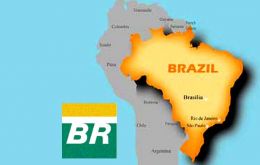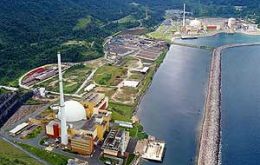MercoPress. South Atlantic News Agency
Energy & Oil
-
Thursday, August 14th 2008 - 21:00 UTC
YPF announces plans for off-shore drilling in Santa Cruz

Argentine Oil Corporation YPF announced this week a 500 million US dollars annual investment plan to be mainly implemented in the Patagonian province of Santa Cruz to help sustain hydrocarbons extraction in the San Jorge Gulf basin
-
Thursday, August 14th 2008 - 21:00 UTC
Desire Petroleum closer to begin drilling in Falklands

AIM listed Desire Petroleum Plc. announced on Thursday that a formal farm-out agreement has been entered into with Arcadia Petroleum Ltd following the approval of the Falkland Islands Government.
-
Thursday, August 14th 2008 - 21:00 UTC
Brazil invests in research for bio-fuels from micro-algae

Brazil will allocate 4.5 million Reais (approx. 2.8 million US dollars) in non-refundable credits to research projects exploring the use of aquaculture or micro-algae products in biodiesel production.
-
Wednesday, August 13th 2008 - 21:00 UTC
Energy short Chile looks for potential alternative sources

As global temperatures and energy prices soar, scientists, policymakers and environmentalists throughout the world are scrambling for solutions. For its part, Chile could meet as much as half its electricity demands with clean energy, according to a report released Friday by energy experts from the Universidad de Chile and Universidad Tecnica Federico Santa Maria.
-
Thursday, August 7th 2008 - 21:00 UTC
Brazil and Paraguay ready for the Itaipu energy price dispute
Paraguay and Brazil are preparing for a long dispute over prices from energy generated in South America's largest dam, shared by the neighboring countries, but which is almost entirely absorbed by the industrial hub of Sao Paulo.
-
Thursday, August 7th 2008 - 21:00 UTC
Petrobras announces new light oil discovery off Rio

Brazil's government managed oil and gas corporation Petrobras announced on Thursday a new discovery of light oil with an API grade of around 30 in the ultra deep Santos Basin off the Sao Paulo coast.
-
Monday, August 4th 2008 - 21:00 UTC
Brazil authorizes expansion of nuclear power program

The Brazilian government has authorized the resumption of plans to expand the country's nuclear power program, basically a third power plant. Work on the Angra 3 reactor, near Rio de Janeiro, has been stalled for 22 years by a lack of money and political issues.
-
Sunday, August 3rd 2008 - 21:00 UTC
“Cool UN” initiative: dress causal and turn down air conditioning

Critics who say the United Nations only churns out hot air will find even more of the stuff if they visit the UN New York headquarters this month. Under the Cool UN initiative, the air conditioning will be turned down and temperatures will rise several degrees.
-
Saturday, August 2nd 2008 - 21:00 UTC
Venezuela to help Bolivia boost natural gas production
Bolivia with the help of Venezuela unveiled a plan to increase the country's natural gas reserves to supply energy thirsty neighbors, Brazil and Argentina. Bolivia has 48.7 trillion cubic feet of proven and probable natural gas reserves, the second-largest deposits in South America after Venezuela.
-
Saturday, August 2nd 2008 - 21:00 UTC
Spain and Chile plan largest wind farm in South America

Chile and Spain will spend more than one billion US dollars to set up Latin America's largest wind farm in the South American country, according to the Spanish news agency EFE.
